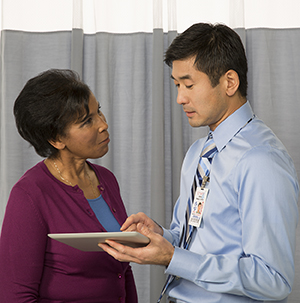Surgical Breast Biopsy: Your Experience
Surgical Breast Biopsy: Your Experience

Understanding the risks
Risks that may happen with surgical biopsy include:
Excessive bleeding or bruising
Infection
Problems from the anesthesia
Poor wound healing
Change in breast shape
False-negative result
Before the biopsy
Tell your surgeon about any medicines, vitamins, supplements, or herbs you take. This includes prescription medicines. And it includes over-the-counter medicines, such as aspirin. Some of these may affect your body’s response during surgery. On the day of the biopsy, wear a loose shirt that buttons in front. Also, be sure to arrange for a trusted adult to drive you home.
After the biopsy
In most case, you can go home the day of the biopsy. You may have bruising and swelling for a few days. If you need them, your surgeon may prescribe pain medicines. Be sure you know what type of pain medicine you can take if you need it. Ice packs can also help ease minor soreness or swelling. Leave your bandage (dressing) on for as long as your surgeon suggests. Also, follow your surgeon’s advice about bathing and exercise.
Don't do any physical work or strenuous activity for the first 24 hours after the procedure. You can usually return to your normal routine after this brief period of rest.
Ask how long you should use a waterproof ice pack over the biopsy area. To make an ice pack, put ice cubes in a plastic bag that seals at the top. Wrap the bag in a clean, thin towel or cloth to protect your skin. Never put ice or an ice pack directly on the skin.
Ask when your bandage can be taken off. Also ask when you can take medicine again, including aspirin.
You may have a bruise for 1 to 2 weeks after the procedure. This is normal. You may also have a tiny scar. Ask about wearing a supportive bra to help with discomfort.
If you have fever, excessive bleeding, swelling, or other problems, call your healthcare provider.
Ask your healthcare provider when you will get the results of the biopsy and who will explain them to you.
When to call your surgeon
Call your surgeon if you have any of these:
A fever over 100.4°F (38°C) or higher, or as advised by your healthcare provider
Increased pain, warmth, or redness at the incision site
Severe swelling that doesn’t go away in a few days
Drainage from the incision site
Bleeding that soaks through the dressing
Talk with your healthcare provider about what problems to look for and when to call them. Know what number to call with questions or problems, including after office hours, on weekends, and on holidays.
Updated:
February 10, 2018
Sources:
Breast Biopsy. UpToDate
Reviewed By:
Gersten, Todd, MD,Stump-Sutliff, Kim, RN, MSN, AOCNS